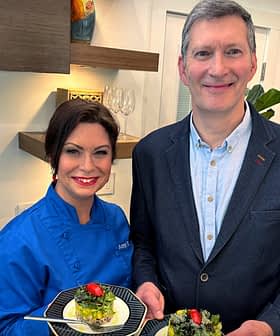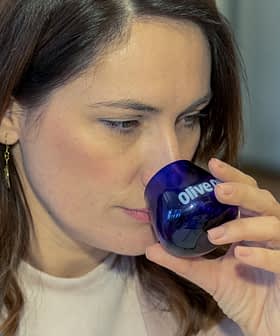
Not ten years ago, many in the UK would have scoffed at the notion of swilling olive oil around their palate. Beer, wine, whisky and cheese have long inspired epicurean taste buds in Britain. But to line up a selection of ten varieties of pressed olive oil seemed a tasting session too far. Oil, after all, was for cooking — not for consuming straight. All that has changed. Thanks to a combination of cookery shows, the internet, and increasing availability of quality olive oil, Britons now want to comprehend and express the magic behind the product.
One might forgive the UK for being slow off the mark. The climate of this exposed island nation doesn’t lend itself to olive cultivation. It’s true that the Romans introduced olive oil to the Britons many centuries ago, although according to Stuart Jeffries in The Guardian, “it proved about as appealing to the local population as wearing togas and open-toed sandals.” Historically, butter was invariably used on bread, while vegetable oil and slabs of white lard were used for cooking. The concept of drizzling oil over salads and bread would have raised eyebrows.
It took until the early 1990s for olive oil to make its first visible impact on British eating habits. From that point, a steady rise in its consumption is recorded; between 1990 and 2009, the UK’s share of the world consumption of olive oil rose from 1.9 percent to 2.9 percent as celebrity chefs like Jamie Oliver, Nigella Lawson and Gordon Ramsey have inspired the UK to go for olive oil. So too has the proliferation of olive product outlets, physical and online. Today, says The Food and Drink Innovation Network, the UK consumes 28 million liters of olive oil per year and half of UK households now use olive oil.
Despite the consistent rise of olive oil consumption, much of it is used for cooking, or for blending with other ingredients. But a few pioneers are teaching Brits how to assess an oil and to appreciate origins, varieties, complex aromas and tastes. Judy Ridgeway has written four books on olive oil, including Judy Ridgway’s Best Olive Oil Buys Round The World. Ever enthusiastic to spread her knowledge of olive oil, Ridgway leads regular tasting and appreciation sessions in London and Brighton. Michael North, a.k.a. ‘The Olive Oil Man’ is another proponent. Members of North’s Seasonal Fresh Olive Oil Members Club enjoy fresh oils, painstakingly selected by North himself.
Writings on olive oil tastings is becoming commonplace in the UK too. National publications such as The Guardian and The Independent are eager to tell UK readers the Ten Best Olive Oils, and ‘How to tell if your olive oil is the real thing’. The Olive World Almanac – containing tasting notes, olive varietal descriptives, recipes and more – is updated every harvest, and has become something of a bible for UK oil aficionados.
Today’s British food lover is far less likely to be fobbed off by inferior olive oil than they would have been less than a decade ago. And Brits were notably vocal during the public outcry against the EU’s short-lived ban on unmarked olive oil jugs on restaurant tables. For the first time in its history, the UK can claim to hold a genuine flame for quality olive oil in its purest form.







